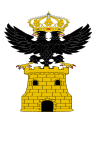Villaluenga de la Sagra facts for kids
Quick facts for kids
Villaluenga de la Sagra
|
||
|---|---|---|
|
||
| Country | ||
| Autonomous community | Castile-La Mancha | |
| Province | Toledo | |
| Municipality | Villaluenga de la Sagra | |
| Area | ||
| • Total | 27 km2 (10 sq mi) | |
| Elevation | 520 m (1,710 ft) | |
| Population
(2018)
|
||
| • Total | 3,769 | |
| • Density | 139.6/km2 (362/sq mi) | |
| Time zone | UTC+1 (CET) | |
| • Summer (DST) | UTC+2 (CEST) | |
Villaluenga de la Sagra is a municipality located in the province of Toledo. This area is part of the Castile-La Mancha region in Spain. A municipality is like a local government area, similar to a town or a small city.
In 2018, a census showed that Villaluenga de la Sagra had 3,769 people living there. The town is situated about 520 meters (1,706 feet) above sea level. It covers an area of 27 square kilometers (about 10 square miles).
Contents
Location and Geography
Villaluenga de la Sagra is found in the central part of Spain. It is in the northern area of the Toledo province. The region it belongs to, Castile-La Mancha, is known for its wide plains. These plains are often used for farming.
The town's location is important for its history and development. Being close to larger cities like Toledo means it has good connections. The landscape around Villaluenga de la Sagra is typical of the La Sagra region. This area is generally flat or gently rolling.
What is a Municipality?
A municipality is a local area that has its own government. This government helps manage local services for the people living there. These services can include things like keeping the streets clean. They also manage local schools and public spaces.
The people living in a municipality elect their own leaders. These leaders make decisions for the community. Villaluenga de la Sagra is one of many municipalities in Spain. Each one plays a role in the country's overall structure.
Population and People
The number of people living in Villaluenga de la Sagra has changed over time. In 2006, there were 3,216 inhabitants. By 2018, this number grew to 3,769. This shows that more people are choosing to live in the municipality.
Understanding the population helps us know more about the community. It tells us how many people use local services. It also helps local leaders plan for the future. For example, they might need more schools or parks.
Images for kids
See also
 In Spanish: Villaluenga de la Sagra para niños
In Spanish: Villaluenga de la Sagra para niños
 | Precious Adams |
 | Lauren Anderson |
 | Janet Collins |




